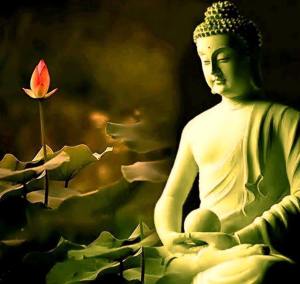
An intelligent person does not blame someone whose mind is always helplessly victimized by faults.
Thinking, “this person’s wrongful conduct is involuntary,” her mercy increases.
—Maitreya, Mahayanasutralamkara


We may pretend to be Buddhists, but if we do not have a wisdom point of view and the compassion that the Buddha Shakyamuni revealed again and again, then whatever Dharma acts we perform are just Dharma drama for the nihilist audience to senselessly gossip about during intermission.
– Thinley Norbu Rinpoche
With thanks to Just Dharma Quotes

If you practice compassion, whether you believe in a religion or not, you will come to realize the value of compassion for your own peace of mind. The very atmosphere of your own life becomes happier, which promotes good health, perhaps even a longer life. By developing a warm heart, we can also transform others. As we become nicer human beings, our neighbors, friends, parents, spouses, and children experience less anger. They will become more warmhearted, compassionate, and harmonious. You will see the world around you change little by little. Even a small act of compassion grants meaning and purpose to our lives.
Long before the 10 Commandments, or Buddhism, ever existed were the 42 Laws of Ma’at from Ancient Egypt.
They represent the essential blueprints for our growth and refinement as a person.

The essence of the Buddha’s Dharma has always been the same through infinite time and space. No matter what plot of existence it is, no matter what language it is taught, and no matter the culture that stops it, the essence has always been and always will be wisdom (the awakening state) and compassion.
~Chamtrul Rinpoche


1. The person who lives by great compassion will attain the Mind of Enlightenment.
2. The person who does not practice hypocrisy will be able to hold firm to the Dharma Principles.
3. The person who does not practice deception will be able to keep their sacred pledge.
4. The person who is free from attachment will form no false friendship.
PADMASAMBHAVA





It can be said that there are two kinds of suffering. Perhaps ninety-five percent of the suffering we endure every day is not at all necessary. Because of our lack of insight, we cause suffering to ourselves and others, including our beloved ones. But the remaining five percent is born out of contact with the real suffering around us and inside of us. To be aware of this kind of suffering brings about compassion, the energy necessary to transform ourselves and help relieve the suffering of the world.
– Thich Nhat Hanh
Painting: © Picasso

An intelligent person does not blame someone whose mind is always helplessly victimized by faults.
Thinking, “this person’s wrongful conduct is involuntary,” her mercy increases.
—Maitreya, Mahayanasutralamkara

“Close both eyes, see with the other one. Then we are no longer saddled by the burden of our persistent judgments, our ceaseless withholding, our constant exclusion. Our sphere has widened and we find ourselves quite unexpectedly in a new expansive location, in a place of Endless Acceptance and Infinite Love.”
~ Gregory Boyle ~

Some Buddhists believe that when one of their adherents departs from this world, they are placed by Guanyin in the heart of a lotus, and then sent to the western Pure Land of Sukhāvatī.[3] Guanyin is often referred to as the “most widely beloved Buddhist Divinity” with miraculous powers to assist all those who pray to her, as is said in the Lotus Sutra and Karandavyuha Sutra.

Humans are set apart from other types of sentient beings by their ability to naturally connect with sharp intelligence and with nonviolence, loving-kindness, and compassion. From the moment we are born, we are constantly chasing after happiness, thinking of ways we can become happy and free from suffering, and we actively try to bring those desires to fruition. The propensities toward loving-kindness, compassion, and nonviolence we display in following this quest for happiness demonstrate what makes human beings unique.
For any species of sentient being to continue existing, the members of that species must have affection for each other and they must support each other. In order for our human community to survive, we must nurture and sustain connections of love, compassion, nonviolence, and altruism. These connections are what will allow us not only to survive, but to make our lives meaningful. If we concentrate on ensuring that these connections are present, that in itself will be enough.
All of the Buddha’s teachings are based on refraining from harming others and engaging in helping others. It is therefore of great importance for Buddhists to have these two principles as the ground of their practice. The roots of Buddhist practice are the attitudes of altruism and non-harm. In other words, the roots of Buddhist practice are loving-kindness and compassion.
– 17th Karmapa
source: http://bit.ly/2GG2rG1
 From generosity comes wealth;
From generosity comes wealth;
happiness from ethical conduct.
From patience comes beauty;
splendor from joyous effort.
Through concentration comes peace;
from wisdom comes liberation.
Compassion accomplishes all aims.
—Nagarjuna, Precious Garland

Compassion practice is daring. It involves learning to relax and allowing ourselves to move gently toward what scares us. The trick to doing this is to stay with emotional distress without tightening into aversion; to let fear soften us rather than harden into resistance. We cultivate bravery through making aspirations. We make the wish that all beings, including ourselves and those we dislike, be free of suffering and the root of suffering.
– Pema Chödron

“Developing the nectar of compassion in our own heart is the only effective spiritual response to hatred and violence.”
– Thich Nhat Hanh
Recent Comments